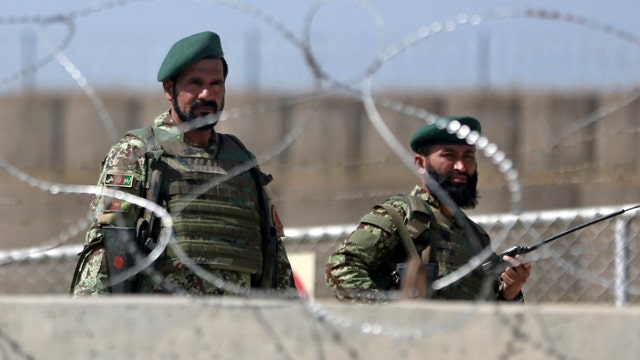The brazen killing of an American two-star general in an Afghan “insider attack” is raising new concerns in Washington that U.S. forces, when the combat mission ends in December, could leave behind a country vulnerable to extremists waiting in the wings.
Leading Republican lawmakers, who have long accused the administration of following a political timetable in Afghanistan and worry the country could follow in the path of unstable Iraq, pointed to the attack as another sign that militants are sending a message to the Afghan population.
“The Taliban’s recent campaign of high-profile attacks is calculated to accompany a global PR strategy highlighting the fact that U.S. and coalition forces will soon be leaving Afghanistan and abandoning its weak and ineffective government. The Taliban wants everyone to know it will soon dominate all aspects of life in Afghanistan once again,” House Speaker John Boehner said in a statement.
“I have told the president privately and publicly that my biggest concern is that America will end its mission in Afghanistan just short of the goal line. … So let me reiterate: if the president decides to re-think his strategy, including withdrawals, deadlines, and policy restraints, particularly on certain associated terrorist networks, he will have my support.”
According to the administration’s latest timetable, announced in May, the U.S. combat mission will end in December of this year. Under the tentative plan, 9,800 U.S. troops will remain at the start of 2015, but that number will be cut in half by the end of next year. By the end of 2016, the U.S. is expected to maintain a “normal embassy presence” like it does in Iraq.
The plan is subject to change, particularly if Afghanistan’s next president does not sign a vital security pact. Hamid Karzai would not sign the agreement -- while the next president is expected to, that election remains contested as candidates Abdullah Abdullah and Ashraf Ghani battle over allegations of fraud and await a vote audit.
House Armed Services Committee Chairman Buck McKeon, R-Calif., after the shooting on Tuesday, said “the event only underscores the importance of leaving Afghanistan when the job is finished -- rather than stubbornly adhering to arbitrary political deadlines.”
Sen. Jim Inhofe, R-Okla., top Republican on the Senate Armed Services Committee, said the incident is a reminder that “force protection” remains a critical mission.
“As the president withdraws our forces, it is critically important that we listen to our commanders on the ground to determine what is necessary to safely and effectively accomplish our mission in Afghanistan,” he said in a statement.
The investigation into the killing of Maj. Gen. Harold J. Greene, the highest-ranked U.S. officer to be slain in combat since 1970 in the Vietnam War, continued Wednesday without any clear answers into why a man dressed in an Afghan army uniform opened fire. The shooting wounded about 15 people, including a German general and two Afghan generals.
In a statement, NATO said Greene's body was being prepared to be flown to the U.S. via Dover Air Force Base in Delaware.
"Our thoughts and prayers are with Maj. Gen. Greene's family, and the families of our soldiers who were injured yesterday in the tragic events that took place in Kabul," NATO said. "These soldiers were professionals, committed to the mission."
Greene, a 34-year U.S. Army veteran, was the highest-ranked American officer killed in combat in the wars in both Afghanistan and Iraq. About half of the wounded in Tuesday's attack at Marshal Fahim National Defense University were Americans, several of them reported to be in serious condition.
At the White House on Tuesday, Press Secretary Josh Earnest called the shooting a “painful reminder of the service and sacrifice that our men and women in uniform make every day for this country.”
But he maintained that coalition forces have “made tremendous progress in disrupting, dismantling and defeating Al Qaida operations and leadership in Afghanistan.” He also cited “progress in winding down U.S. involvement in that conflict.”
The Associated Press contributed to this report.






















